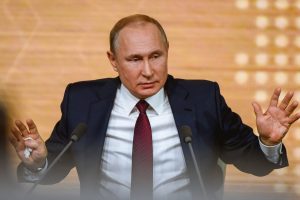Russian President Vladimir Putin will not attend this week’s East Asia Summit (EAS) in Phnom Penh and is not certain to attend the G-20 leaders’ summit next week, despite receiving an invitation from host Indonesia.
Putin’s likely absence from the EAS was reported by Russian state media yesterday, with Kremlin spokesperson Dmitry Peskov telling reporters that a trip to Phnom Penh for the summit was “not planned,” despite the report also noting that Putin’s Aide Yury Ushakov said that the Russian president planned speeches at several summits, including the East Asia Summit.
Similarly, in an interview with the Financial Times published yesterday, Jokowi said that a conversation with Putin last week left him with a “strong impression” that the Russian leader would also attend the G-20 meeting, which is being held in Bali on November 15-16.
While Putin could still attend either summit by video link, his physical absence would relieve Western leaders of the awkward optics of being present in the same room as the Russian leader.
Whether or not host nations Indonesia and Cambodia would welcome this turn of events is hard to say, though the stakes are arguably much higher for the former. The summit will be a significant one for President Jokowi. The Indonesian leader is generally not known for taking a close interest in foreign affairs but views his nation’s chairmanship of the G-20 as an opportunity to raise his country’s profile on the international stage. And the participation of all members of the grouping, including Russia, is no doubt important for Indonesia, which is worried about its overwhelmingly economic agenda being overshadowed by the Russia-Ukraine war.
At the same time, there is no doubt that the Russian invasion of Ukraine, and the Western unity that it has galvanized, have vastly complicated Jokowi’s task. Since the invasion in February, Indonesia has faced intense pressure from Western countries to disinvite Russia from the leaders’ summit and even to expel it from the grouping altogether.
Jakarta has resisted these pressures, hewing to its plans for the summit, while claiming it does not have the authority to eject Russia from the G-20 without a consensus among its members. (Indeed, one of China, India, South Africa, or Saudi Arabia would almost certainly veto such a move.) To assuage outside criticisms, Indonesia has invited Ukrainian President Volodymyr Zelenskyy to appear, either in person or by video link, and also undertook a “peace mission” in Kyiv and Moscow earlier this year in which he offered to mediate the conflict and sought to secure supplies of grain from conflict-torn eastern Ukraine.
In his interview, Jokowi confirmed that Russia remains a welcome participant in the summit, which he feared was being overshadowed by a “very worrying” rise in international tensions. “The G-20 is not meant to be a political forum. It’s meant to be about economics and development,” he said, repeating a message that his government has made consistently since the invasion.
However, should Putin stay away, the Indonesian government could well come to view Putin’s absence as a blessing in disguise. The Russian president’s presence at the meeting would undoubtedly dominate the proceedings and could create a situation in which leaders’ attendance at important sessions could be seen as a referendum on their nations’ positions on the Ukraine war. In this context, it is hard to see how Indonesia’s ambitions for the summit would be fulfilled.
No doubt the coming days will bring clarity. But Jokowi could end up with the best of both worlds: Putin’s absence, without having actually to take the step of disinviting him from the summit.

































